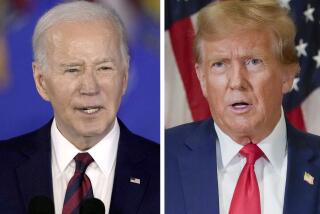GOP Stall Tactics Damage Judiciary, President Charges
Turning up the heat in a simmering partisan dispute, President Clinton on Saturday accused Senate Republicans of systematically blocking his nominations to the federal judiciary and creating “a vacancy crisis in our courts.”
Using unusually pointed language, Clinton charged in his weekly radio address that a Republican slowdown in the consideration of judicial nominations has left the federal courts “strained to the breaking point.”
“The Senate’s failure to act on my nominations, or even to give many of my nominees a hearing, represents the worst of partisan politics,” Clinton declared. “Under the pretense of preventing so-called judicial activism, they have taken aim at the very independence our founders sought to protect.”
Clinton’s comments represented a dramatic public escalation of what until now has been mostly a backstage test of wills between the White House and congressional Republicans, who have vowed to resist “judicial activists” and accused Clinton of moving too slowly to produce nominations.
The GOP radio address, recorded Friday, did not respond to Clinton’s accusations. Instead, House Speaker Newt Gingrich (R-Ga.) celebrated the three-year anniversary of the “contract with America” that congressional Republicans offered during the 1994 campaign.
Citing the reform of welfare, the legislation creating a line-item veto for the president and the approval of a $500-per-child tax credit as part of the balanced-budget deal completed last summer, Gingrich said the GOP had kept its promises to voters. “Some politicians,” he said, “tell the truth, and some elected officials keep their promises.”
Although Republicans passed much of their manifesto, some elements were modified and one-- term limits for members of Congress--was rejected.
The issue of court appointments has become increasingly polarized since late in Clinton’s first term.
During last year’s presidential campaign, Republican nominee Bob Dole accused Clinton of appointing “liberal judges,” though the issue did not prove as powerful as Dole’s advisors hoped. This year, House Majority Whip Tom DeLay (R-Texas) proposed that Republicans seek to impeach federal judges they considered guilty of excessive activism.
“President Clinton fails to recognize the dangers of judicial activism, the necessity of judicial restraint and the role the Congress should play to protect our Constitution and preserve our system of checks and balances,” DeLay said in a statement after Clinton’s address.
From the other side of the spectrum, Clinton has faced growing pressure from liberal groups and Democrats on the Senate Judiciary Committee to confront Republicans over the slow pace of action on his judicial nominations. Last week, for instance, Elliot Mincberg, legal director of People for the American Way, a liberal advocacy group, called the confirmation slowdown “a palpable threat to the system of checks and balances that forms the core of American democracy.”
As Clinton noted in his address, the stand-off between the White House and the Senate has left the federal courts struggling with an unusually high rate of vacancies.
Nearly 100 seats--or about one in every nine--are now vacant on the federal courts.
Through 1996, the Senate approved just 17 of Clinton’s nominations to federal district courts and none for the appeals courts.
By comparison, the Democratic-majority Senate approved 66 judicial appointments during George Bush’s last year in the White House, according to a report released last week by People for the American Way.
In his radio address, Clinton claimed the GOP’s 1996 judicial confirmation record constituted the “lowest election-year total in 40 years.” So far this year, the Senate has approved 18 of Clinton’s nominees to the federal bench.
As of August, more than 20% of the 55 federal trial judgeships in California were vacant, according to Robert M. Kaufman, president of the American Judicature Society, a nonprofit organization that promotes an effective judiciary. Almost 33% of the 97 judicial chairs in the U.S. 9th Circuit, which includes California and eight other Western states, were empty.
The 9th Circuit Court of Appeals has 28 authorized judgeships, but only 18 are filled.
Republicans point fingers back at Clinton for not moving more quickly to select nominees for the vacancies. Though Clinton said Saturday he has now sent 70 nominations to the Senate this year, as recently as July 1, he had forwarded fewer than 40.
“The Clinton administration must also share responsibility for the large number of vacancies,” concluded the People For the American Way analysis.
Clinton said the vacancies had left the courts clogged with backlogs in civil and criminal cases. “An unprecedented number of civil cases are stalled . . . [and] nearly 16,000 criminal cases are caught in limbo,” he said.
Republicans, such as Senate Judiciary Committee Chairman Orrin G. Hatch (R-Utah), argue that they are merely fulfilling their constitutional duty to scrutinize judicial nominees.
But Clinton accused the GOP of “intimidation” and said his nominees have “had the highest rating of ‘well qualified’ from the American Bar Assn. of any president since these ratings have been kept.”
More to Read
More to Read
More to Read
Get the L.A. Times Politics newsletter
Deeply reported insights into legislation, politics and policy from Sacramento, Washington and beyond. In your inbox three times per week.
You may occasionally receive promotional content from the Los Angeles Times.






